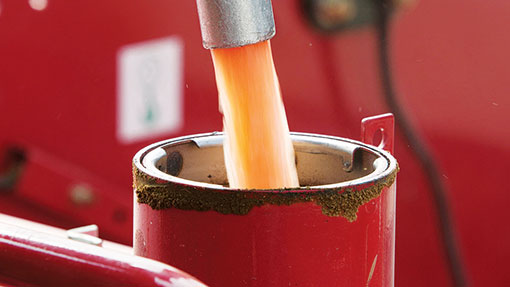
Red diesel, also known as gas oil, is a vital fuel across the UK, powering tractors, generators, construction equipment, and even certain boats. It has been an essential part of agriculture and industry for decades due to its affordability compared to regular white diesel. Its bright red dye is not just cosmetic but an important legal marker that distinguishes it from road-legal diesel.
However, the use of red diesel is tightly controlled, and the rules surrounding it have become even stricter since 2022. While it remains legal in sectors such as farming, forestry, and commercial marine work, misuse on public roads can result in heavy fines and serious legal consequences. This article explores what red diesel is, why it matters, how much it costs, and the laws you must understand to stay compliant.
What Is Red Diesel?
Red diesel is chemically identical to standard diesel fuel used in road vehicles, but it is dyed a vivid red colour to make it easily identifiable. The dye is crucial because it allows HMRC and law enforcement officers to quickly determine whether a vehicle is using it illegally. Without this distinction, the lower tax rate applied to red diesel would be much easier to abuse.
Since its introduction in the 1960s, red diesel has been widely referred to by different names, including rebated fuel, cherry red, gas oil, and tractor diesel. While these names often depend on the industry or region, they all describe the same fuel. Its cost efficiency has made it indispensable, but it has also earned notoriety due to frequent misuse cases where drivers attempt to cut costs illegally.
Why Red Diesel Is Used
The biggest advantage of red diesel is cost. Because it is taxed at a lower rate, industries that qualify to use it can save significant amounts of money, particularly where heavy machinery or large-scale fuel consumption is involved. Farmers rely on it daily for tractors, combine harvesters, and irrigation pumps, while construction companies use it for excavators, bulldozers, and cranes.
Its benefits extend beyond heavy machinery. Red diesel is also used in static equipment such as generators, which are essential for backup power on farms, construction sites, and even hospitals. In the marine sector, fishing boats and other commercial vessels often use red diesel to keep operations running efficiently. This wide range of applications explains why it remains so essential despite growing environmental scrutiny.
Red Diesel Rules and Restrictions in the UK

The rules around red diesel have always been strict, but in April 2022, the government tightened restrictions to reduce carbon emissions and ensure fair taxation. Before the changes, many industries enjoyed access to rebated fuel, but today it is limited primarily to agriculture, horticulture, forestry, commercial marine activity, and certain types of heating. This means construction firms and other industries once reliant on red diesel must now switch to alternatives.
It is completely illegal to use red diesel in on-road vehicles. HMRC conducts regular roadside inspections, dipping fuel tanks to check for traces of red dye. The consequences of being caught can be severe, ranging from heavy fines to vehicle seizure and prosecution. In both the UK and Northern Ireland, “red diesel alerts” are periodically announced, warning businesses and drivers of increased enforcement efforts.
Red Diesel Price in the UK
The price of red diesel in the UK is not fixed and fluctuates based on global oil prices, tax policies, and market demand. While it is always cheaper than white diesel due to its lower duty, the difference can vary from one supplier to another. For this reason, many businesses closely track the red diesel price to plan their operating costs effectively.
Purchasing options also affect cost. Farmers and large businesses often buy in bulk, such as a 45-gallon drum of red diesel, to secure better rates. Smaller users might search for “red diesel near me” to find 20-litre containers for generators or heating. Despite convenience, it is crucial to ensure that any supplier is authorised, as buying from unlicensed sellers can lead to contaminated fuel and legal issues.
Where to Buy Red Diesel in the UK
Legitimate suppliers across the UK provide red diesel to industries that qualify under HMRC rules. Reputable fuel distributors can deliver in bulk directly to farms, construction yards, and marine ports. Ordering from these suppliers ensures that the fuel meets safety standards and that the purchase remains fully compliant with tax laws.
Consumers should avoid the temptation to buy from unauthorised sellers advertising cheap red diesel for sale. These suppliers may offer low prices, but they carry serious risks, including poor-quality fuel and heavy legal penalties. The safest way to buy red diesel is always through accredited distributors who understand the regulations and can provide documentation for HMRC compliance.
Alternatives and Misconceptions About Red Diesel
With restrictions tightening, many industries are now considering alternatives to red diesel. One of the most popular substitutes is HVO (hydrotreated vegetable oil), a renewable and cleaner-burning fuel that helps businesses lower their carbon footprint. While HVO is often more expensive, it provides a future-proof solution as the UK moves towards greener energy.
It is also worth noting that red diesel has become a cultural term, often appearing in unusual contexts. References to red diesel perfume, aftershave, or even a red diesel drink circulate online, but these have no relation to the actual fuel. They are simply quirky product names that capitalise on the fuel’s notoriety, and they should never be confused with the real, heavily regulated product.
Conclusion
Red diesel remains one of the UK’s most important fuels, providing affordable power for farms, construction sites, and marine industries. Its lower cost makes it attractive, but its restricted use means businesses must be fully aware of the law to avoid costly mistakes. HMRC enforcement is strong, and ignorance is never an excuse.
Looking ahead, the role of red diesel may diminish as environmental policies push industries towards cleaner alternatives. For now, however, it remains a vital part of the UK economy. Staying informed about red diesel prices, buying from reputable suppliers, and complying with regulations are the keys to making the most of this essential but restricted fuel.
FAQs on Red Diesel
What is red diesel fuel?
Red diesel is standard diesel dyed red to indicate its lower tax duty and restricted use in specific industries.
Why is red diesel illegal on UK roads?
It is illegal because it carries a lower tax and is intended only for off-road machinery, agriculture, and marine use.
How much is red diesel per litre in the UK?
The price changes daily depending on oil markets, but it remains cheaper than standard road diesel.
Can I buy red diesel near me in small amounts?
Yes, some suppliers offer 20-litre containers, but always check that the supplier is licensed.
What happens if I get caught using red diesel illegally?
HMRC can issue large fines, seize vehicles, and pursue prosecution for misuse.
Are there alternatives to red diesel?
Yes, renewable fuels such as HVO are increasingly used as cleaner, legal alternatives.
Why do people mention red diesel aftershave or perfume?
These are unrelated consumer products that borrow the name “red diesel” but have no link to the actual fuel.
You may also read: Bridge Farm Campsite: Your Ultimate Guide to a Memorable Camping Experience








